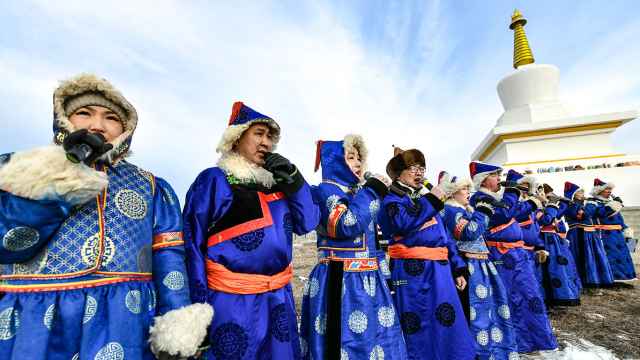A brief acquaintance that remained vivid in my memory for 20 years flooded back to me when my Russian nephew arrived in Moscow to visit his family this week.
My nephew Ivan Yakut, or Vanya, according to the diminutive form of his first name, is now a bassoonist living in Spain. When I first met him by marrying his aunt he was a rambunctious, eight-year-old kid. One of the first things I did with Vanya was to accompany him, his mother and my wife to see his famous paternal grandfather Vsevolod Yakut perform at the Yermolova Theater. This happened in April 1990, when Vanya was nine. I never saw Vsevolod perform again. He died the following March on the night of a premiere that I did not attend.
Both of these shows, the one I did see ("The Dresser") and the one I did not ("Caligula"), contained ties to my future that no one could have known.
The designer of "The Dresser" was Dmitry Krymov, who had no idea he would one day direct a show called "Tararabumbiya," in which my wife Oksana Mysina would play a part. Furthermore, the musical director of both "Caligula" and "Tararabumbiya" was Lyudmila Bakshi, who, as it was just revealed to me, was one of those who comforted Vsevolod as he lay dying near his theater's stage door entrance on March 3, 1991.
Vsevolod is now alive again in my memory.
He was one of the Soviet Union's great stars from the 1940s to the 1980s. On stage and screen he performed more than 150 roles. His most famous, unquestionably, was that of Alexander Pushkin in Andrei Globa's play "Pushkin," which ran from 1949 to 1968 and was performed 840 times. His performance in a 1956 film version of Carlo Goldoni's "The Mistress of the Inn" can still be seen on Russian television.
I met Vsevolod several times in the course of one year between 1990 and 1991. He was the kind of person you try to learn something from. He was modest and quiet to extremes, was revered by those who knew them and was legendary for his charm, elegance and tact. An actor's actor, he brought to his work scrupulous attention to detail and total devotion to what he believed to be the magic of his profession. He had the stamp of authenticity and he wore it well.
When sharing an elevator with Vsevolod, there was only one object of attention present. People either kept their silence in deference to the man in their midst or they spoke directly to him &mdash I don't ever recall anyone going on with their own personal conversations while riding the elevator with Vsevolod at the old Actors House on Tverskaya Ulitsa.
This was not because people were starstruck &mdash being starstruck was rarely part of the Soviet cultural experience. It was an expression of love and respect. It was an acknowledgement that a performer or a writer or a painter had played an important role in a shared life. There was a marvelous sense of dignity to this kind of relationship between the famous and their fans in that period. It is not gone entirely now, although things have changed.
I think about Vsevolod Yakut and realize how quaint those little trips on elevators now seem.
Vsevolod was a very small man, although I must not have known that fully the night I went to see him perform. I had only met him briefly a few days before, when he invited us to see "The Dresser," and I remember little about that first acquaintance. Something else I did not know before seeing "The Dresser" was that the play's author Ronald Harwood called the version starring Vsevolod and Zinovy Gerdt the best he had seen in any language. Afterwards, I could have easily guessed that myself.
Vsevolod was magnificent as Sir John, a great Shakespearean actor who lords over, yet is lovingly manipulated and cajoled by, his personal dresser, played by Gerdt. Vsevolod seemed greater in size and scope than all of Shakespeare's grand heroes taken together &mdash Lear, Prospero and all of the kings with all of their numbers. The next day I jotted this down in a diary: "We were amazed by Yakut's (and by Gerdt's) performances. I haven't seen such powerful acting in a long time. No tricks, no director's shenanigans, just rich, deep acting."
From where we sat in the third row, I believe it was, Vsevolod was colossal. He towered over everyone onstage. In fact, I am amazed now to look back at the program from that night and find that there were 15 actors in the cast. I remember two. As for Vsevolod's impression, I felt as though I was kneeling at the foot of an immense monument and staring at it from beneath.
Following the performance we went backstage to thank the actor. My wife knocked on his dressing room door, but no one answered. Hesitating a moment, she finally turned the knob and pushed the door back herself. There sat Vsevolod before the mirror on his dressing table, his back to us. He was hunched over, a tiny little man. The shock was enormous and I have never forgotten it.
I had the chance to talk to Vsevolod at some length a few months later when he attended Vanya's tenth birthday party. I was working on a book about the playwright Nikolai Erdman and was always seeking people who might have known him. Vsevolod, as I learned, still remembered his first meeting with Erdman in 1939.
"Usually people try to talk about themselves, foist ideas and information on others," said Vsevolod in words I jotted down later that evening. "But Erdman impressed me as a man who was interested personally in those around him. He listened carefully to everything that was said, and it was as if he drew energy into himself from those around him, in an open, somewhat childlike manner. He was a great listener. He could have put on airs, being a famous, banned playwright, but he never gave the impression that he was anything other than just another person there."
When Vsevolod's wife, Lybov, suggested that that was natural for those dangerous political times, he said, "No. It had nothing to do with fear, although I don't discount that he experienced fear as well. His silence and his attentiveness obviously stemmed from his own personal makeup. That is simply the type of person he was."
There is more than a little in that description of Vsevolod himself.
He died just hours after performing the premiere of Andrei Zhitinkin's production of "Caligula" on March 3, 1991. He specifically asked that none of us come see that first performance. The show had not yet gelled, he said.
According to stories I heard at the funeral, and which I recorded in my diary, Vsevolod decided it was time to go home following a few speeches and toasts shared backstage among the cast and crew. Several musicians accompanied him to the stage door entrance. As he was putting his coat on, they asked, "Would you like us to flag a taxi for you?" He said, "No, there's a policeman who stands in front of the theater who always gets a taxi for me right away."
The musicians teased him, "Taxis are expensive these days! You think you can find the 120 rubles for a five-minute ride?" Vsevolod, pulling his coat on over his shoulder, began to turn and say something but, instead, fell on the floor. For a half an hour, while waiting for an ambulance, those gathered around him applied mouth-to-mouth resuscitation and heart massages. It was to no avail. By the time a doctor arrived, Vsevolod was dead.
It was a fitting time and place of death for an actor who had devoted 61 of his 79 years to the theater.
A Message from The Moscow Times:
Dear readers,
We are facing unprecedented challenges. Russia's Prosecutor General's Office has designated The Moscow Times as an "undesirable" organization, criminalizing our work and putting our staff at risk of prosecution. This follows our earlier unjust labeling as a "foreign agent."
These actions are direct attempts to silence independent journalism in Russia. The authorities claim our work "discredits the decisions of the Russian leadership." We see things differently: we strive to provide accurate, unbiased reporting on Russia.
We, the journalists of The Moscow Times, refuse to be silenced. But to continue our work, we need your help.
Your support, no matter how small, makes a world of difference. If you can, please support us monthly starting from just $2. It's quick to set up, and every contribution makes a significant impact.
By supporting The Moscow Times, you're defending open, independent journalism in the face of repression. Thank you for standing with us.
Remind me later.






